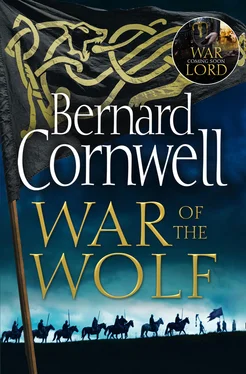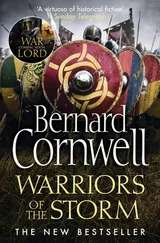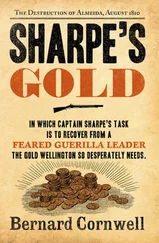‘Father Swithred,’ Æthelstan said as he watched the beaten men walk away, ‘thought we should kill one man in ten. He said it was the Roman way.’
‘Why don’t you?’
‘You think I should?’ he asked.
‘No,’ I said firmly, ‘I think you should let them go. Most of them aren’t warriors. They’re the folk who tend the fields, raise the cattle, dig ditches, and plant the orchards. They’re carpenters and fullers, leather-workers and ploughmen. They came here because they were ordered to come, but once home they’ll go back to work. Your father needs them. Mercia is no use to him if it’s hungry and poor.’
‘It’s little use to him if it’s rebellious.’
‘You’ve won,’ I said, ‘and most of those men wouldn’t know a rebellion from a wet fart. They were led here. So let them go home.’
‘My father might disagree.’
I scoffed at that statement. ‘So why didn’t your father send a relief force?’
‘He’s ill,’ Æthelstan said, and made the sign of the cross.
I let Tintreg walk around an unburied corpse, one of Cynlæf’s house-warriors we had killed the previous day. Snow had settled on the body to make a soft shroud. ‘What’s wrong with the king?’ I asked.
‘Tribulations,’ Æthelstan said curtly.
‘And how do you cure that?’
He rode in silence for a few paces. ‘No one knows what ails him,’ he finally said, ‘he’s grown fat, and short of breath. But he has days when he seems to recover, thank God. He can still ride, he likes to hunt, he can still rule.’
‘The problem,’ I said, ‘sounds like an old sword in a new scabbard.’
‘What does that mean?’
‘It sounds as if his new bride is wearing him out.’
Æthelstan bridled at that, but did not argue. Instead he looked up at the sky that had cleared overnight. A bright sun glinted from the snow. It would melt quickly, I thought, as quickly as the siege had ended. ‘I suppose he’s waiting for the weather to improve,’ Æthelstan went on, ‘which means he might be coming soon. And he won’t be happy that the rebels are leaving unpunished.’
‘So punish their leaders,’ I said. The leaders of the rebellion, at least in northern Mercia, had trapped themselves in the arena.
‘I intend to.’
‘Then your father will be happy,’ I said, and urged Tintreg on to the arena entrance where Finan waited. ‘Any trouble?’ I called out to him. Finan had relieved Berg in the middle of the night, taking fresh troops to guard the arena. Æthelstan had also sent a score of men, and, like Finan, they all looked cold and tired.
Finan spat, evidently a gesture of scorn for the men trapped in the arena. ‘They made one feeble effort to get out. Didn’t even get past their own barricade. Now they want to surrender.’
‘On what terms?’ Æthelstan asked. He had heard Finan, and had spurred his horse forward.
‘Exile,’ Finan said laconically.
‘Exile?’ Æthelstan asked sharply.
Finan shrugged, knowing what Æthelstan’s answer would be. ‘They’re willing to surrender their lands and go into exile, lord Prince.’
‘Exile!’ Æthelstan exclaimed. ‘Tell them my answer is no. They can surrender to my justice, or else they fight.’
‘Exile them to Northumbria,’ I said mischievously. ‘We need warriors.’ I meant we needed warriors to resist the inevitable invasion that would engulf Northumbria when the Mercian troubles were over.
Æthelstan ignored me. ‘How are you talking to them?’ he asked Finan. ‘Are you just shouting through the entrance?’
‘No, you can go inside, lord Prince,’ Finan said, pointing to the closest staircase leading up to the tiered seating. It seemed that at first light Finan had ordered the barricade removed from that entrance and had led a score of men up to the arena’s seats from where they could look down on the trapped enemy.
‘How many are there?’ Æthelstan asked.
‘I counted eighty-two, lord Prince,’ Finan said, stepping forward to hold Æthelstan’s bridle. ‘There may be some we haven’t seen inside the building. And some of those we saw are servants, of course. Some women too.’
‘They’re all rebels,’ Æthelstan snarled. He dismounted and strode towards the staircase, followed by his men.
Finan looked up at me. ‘What does he want to do?’
‘Kill the lot.’
‘But he’s letting the Welsh live?’
‘One enemy at a time.’
Finan turned to watch as Æthelstan and all his warriors filed into the nearest staircase. ‘He’s changed, hasn’t he?’
‘Changed?’
‘Become stern. He used to laugh a lot, remember?’
‘He was a boy then,’ I said, ‘and I tried to teach him how to be a king.’
‘You taught him well, lord.’
‘Too well,’ I said softly, because Æthelstan had come to resemble his grandfather, and Alfred had never been my friend. I thought of Æthelstan as a son. I had protected him through boyhood, I had trained him in the skills of a warrior, but he had hardened in the last few years, and now believed his destiny led to a throne despite all the obstacles that ambitious men would place in his way. And when he was king, I thought, he would lead swords and spears into Northumbria, he would be our conqueror, he would demand my homage and he would require my obedience. ‘If I had any sense,’ I said to Finan as I dismounted, ‘I would side with Cynlæf.’
He laughed. ‘It’s not too late.’
‘Wyrd bið ful āræd,’ I said, and that is true. Fate is inexorable. Destiny is all. We make oaths, we make choices, but fate makes our decisions.
Æthelstan was my enemy, but I had sworn to protect him.
So I told Finan that he should stay outside the arena, told him what he was to do there, then followed my enemy up the stairs.
‘You will throw down your weapons,’ Æthelstan called to the men in the arena, ‘and you will kneel!’ He had taken off his helmet so that the trapped men would have no trouble recognising him. He usually wore his dark-hair cropped very short, but it had grown during the siege and the cold morning wind lifted it and swirled his dark-blue cloak around his mailed figure. He stood in the centre of a line of warriors, all implacable in mail and helmets, all with shields painted with Æthelstan’s symbol of a dragon holding a lightning bolt. Behind them, standing on one of the snow-covered stone tiers, Father Swithred was holding a wooden cross high above his head.
‘What is our fate?’ a man called up from the arena floor.
Æthelstan made no answer. He just stared at the man.
A second man stepped forward and knelt. ‘What is our fate, lord Prince?’ he asked.
‘My justice.’ That answer was said in a voice as cold as the snow-shrouded corpses we had passed on our way to the arena.
Silence. There had to be a hundred horses in the arena. A score of them had been saddled, perhaps readied for a desperate dash through the entrance tunnel, and in front of them, huddled like the horses, were Cynlæf’s men. I looked for Cynlæf himself and finally saw him at the back of the crowd, close to the saddled stallions. He was a tall, good-looking man. Æthelflaed had been fond of him and had chosen him as her daughter’s husband, but if there was such a place as the Christian heaven and she was looking down now she would approve of Æthelstan’s grim resolve to kill Cynlæf.
‘Your justice, lord Prince?’ the kneeling man, who had the sense to use Æthelstan’s title, asked humbly.
‘Which is the same as my father’s justice,’ Æthelstan said harshly.
‘Lord Prince,’ I said softly. I was standing barely two paces behind him, but he ignored me. ‘Lord Prince,’ I said again, louder.
‘Silence, Lord Uhtred,’ Æthelstan said without turning. He also spoke softly, but with a trace of anger that I had dared to intervene.
Читать дальше












